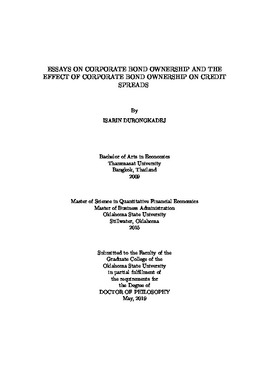| dc.contributor.advisor | Polonchek, John A. | |
| dc.contributor.author | Durongkadej, Isarin | |
| dc.date.accessioned | 2019-10-25T19:02:52Z | |
| dc.date.available | 2019-10-25T19:02:52Z | |
| dc.date.issued | 2019-05-01 | |
| dc.identifier.uri | https://hdl.handle.net/11244/321516 | |
| dc.description.abstract | Debt has become increasingly important as a source of capital for firms. Ninety percent of the new capital issuance is in the form of debt and leverage ratios have increased from 10 to 30 percent in the past century. However, we still do not fully understand the corporate debt market, because the data on the debt market are not as widely available as the stock market. The Gramm-Leach-Bliley Act repealed part of the Glass-Steagall Act in 1999 which allowed financial companies to become more active in financial markets as both issuers and investors in securities. One benefit of this regulatory change was the disclosure of more data regarding who issues and/or owns bonds. A comprehensive bond ownership database is eMAXX by Thomson Reuters. Unlike CRSP and COMPUTSTAT, eMAXX is underutilized by academics. The first chapter includes, first, a discussion of the importance of public debt markets. Second, different bond databases are compared and contrasted with eMAXX. Third, I analyze bond characteristics, investors, issuers, managing firms, and fund managers in turn. The last part of the first chapter includes analyses of bondholding during different corporate events such as bankruptcy and rating changes. Then, the second chapter delves into the aspect of strategic default premium and credit spreads. The previous literature examining the effects of strategic defaults on the pricing of debt contracts has focused primarily on the bargaining power of equity holders. However, in the real world the negotiation of a strategic default involves both equity and debt holders. Omitting debt holders from the analysis results in an incomplete picture of strategic default process. In my dissertation my analysis of the strategic default process includes both equity and debt holders. I find that the bargaining power of bondholders plays a significant role in determining the credit spreads of a bond. Moreover, I find the bargaining power of bondholders to be a new proxy for the decision to enter into a strategic default, a proxy that has the same predictive power of current proxies that rely on rating systems developed by credit rating agencies that report liquidity and credit default likelihood. | |
| dc.format | application/pdf | |
| dc.language | en_US | |
| dc.rights | Copyright is held by the author who has granted the Oklahoma State University Library the non-exclusive right to share this material in its institutional repository. Contact Digital Library Services at lib-dls@okstate.edu or 405-744-9161 for the permission policy on the use, reproduction or distribution of this material. | |
| dc.title | Essays on Corporate Bond Ownership and the Effect of Corporate Bond Ownership on Credit Spreads | |
| dc.contributor.committeeMember | Krehbiel, Timothy L. | |
| dc.contributor.committeeMember | Yan, Shu | |
| dc.contributor.committeeMember | Adkins, Lee C. | |
| osu.filename | Durongkadej_okstate_0664D_16144.pdf | |
| osu.accesstype | Open Access | |
| dc.type.genre | Dissertation | |
| dc.type.material | Text | |
| dc.subject.keywords | bondholders | |
| dc.subject.keywords | bond ownership | |
| dc.subject.keywords | corporate bonds | |
| dc.subject.keywords | credit spreads | |
| dc.subject.keywords | institutional bond ownership | |
| dc.subject.keywords | strategic default | |
| thesis.degree.discipline | Business Administration | |
| thesis.degree.grantor | Oklahoma State University | |
